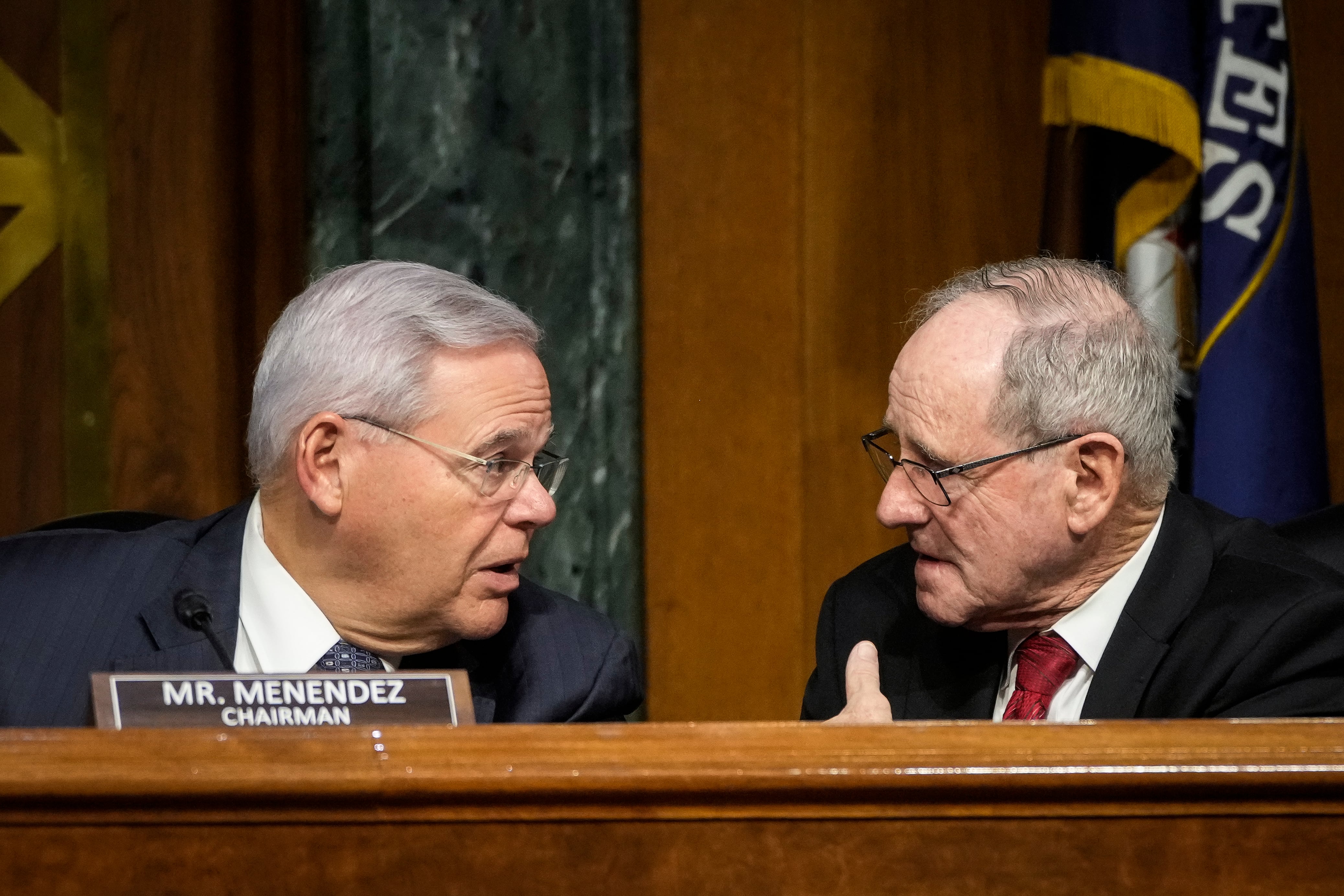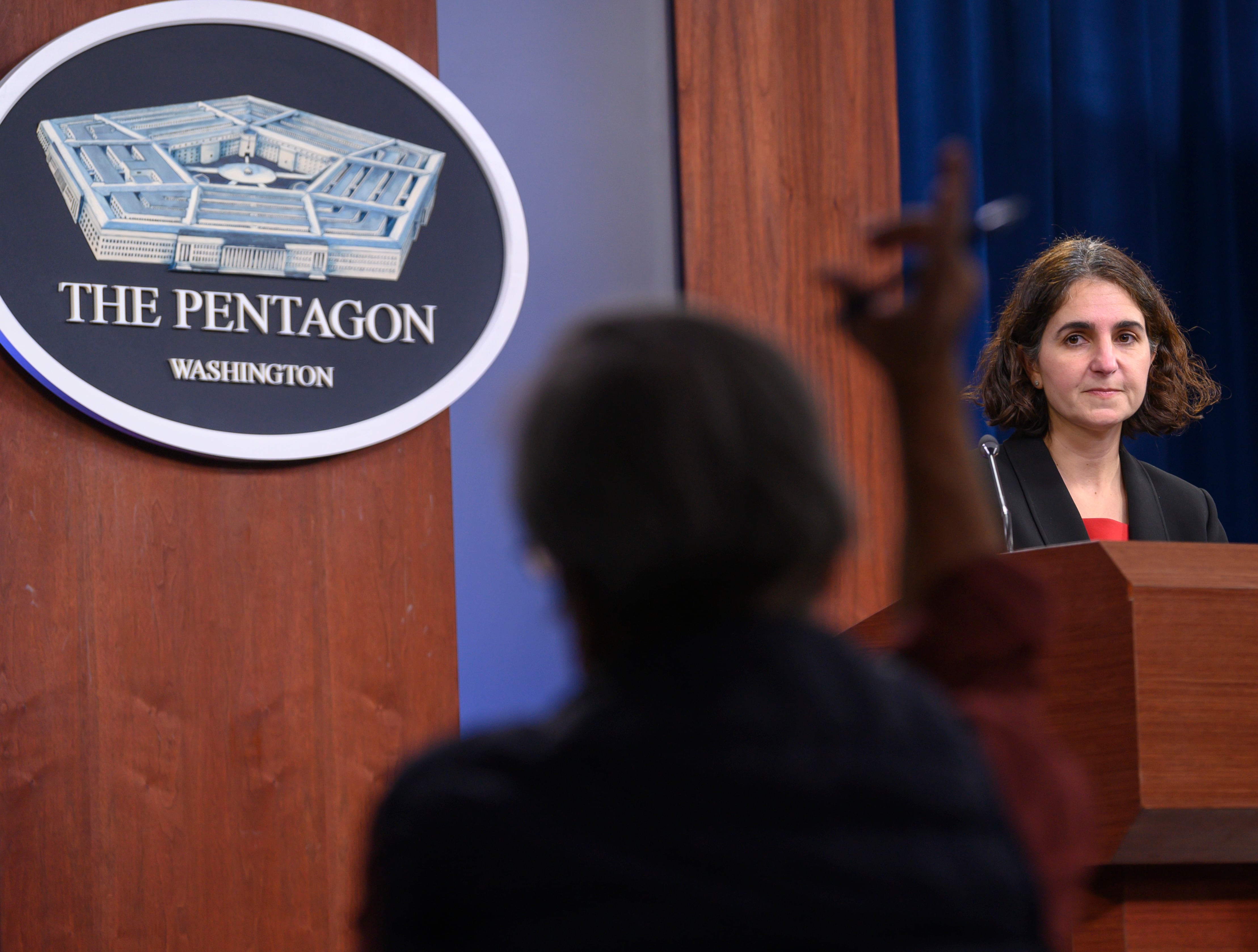WASHINGTON ― With the world transfixed by Russia’s invasion of Ukraine and debates breaking out on Twitter over whether the U.S. should send the country fighter aircraft and missile defense systems, security assistance ― usually a wonky topic ― is having a moment.
But it’s not just about public attention. With Democrats holding the reins in Washington, State Department officials have recommended a list of reforms to America’s globe-spanning security aid programs.
These programs provide billions of dollars in training, equipment and assistance directly to foreign governments, militaries, and international organizations and groups. They tilted in favor of the Pentagon after the Sept. 11, 2001, attacks; now, the State Department and allies on Capitol Hill say they need to be tilted back.
“It’s time for a reckoning,” Senate Foreign Relations Committee Chairman Robert Menendez, D-N.J., said at a recent hearing, where the State Department offered its reform ideas. Powerful lawmakers indicated they were supportive, and Menendez said he will spearhead legislation in the coming months with the panel’s top Republican, Sen. Jim Risch of Idaho.
The State Department’s proposals range from elevating human rights concerns to offering countries more attractive financing for weapons purchases.

The potential for a shakeup comes as the Biden administration rushes aid to Ukraine following Russia’s invasion. The administration had already committed about $2 billion in weapons and other aid to Kyiv, when Congress recently enacted a $13.6 billion package for the region, with $3.5 billion for Ukraine.
The U.S. government has spent hundreds of billions of dollars over the last two decades for programs that provide security assistance and cooperation to foreign countries, according to the Congressional Research Service. In particular, this work has become a core mission for the Pentagon since 9/11.
As building up foreign forces in Iraq and Afghanistan became key to post-9/11 national security plans, Congress gave the Defense Department new authorities and funding. From 2001 to 2022, the budgets for those programs tripled to $18 billion. The proportion managed by the Pentagon grew from 20% to slightly more than half.
Critics of the tilt toward the Pentagon say it relies too much on the military to solve foreign policy problems better handled by, or at least coordinated with, trained diplomats.
And at the center of the current conversation are some high-profile failures of recent years. Despite billions of dollars spent on the Iraqi security forces, for instance, many of them collapsed in the face of attacks from the Islamic State group in 2014. And $125 billion spent to bolster Afghan security forces didn’t stop the same from happening under Taliban pressure last year.
At the recent hearing, Sen. Chris Murphy, D-Conn., said the $87 billion in U.S. security assistance to Afghanistan “went up in smoke overnight” when the Afghan military collapsed, calling it “an extraordinary waste of money.
“Clearly there is something very wrong with the way in which we are flowing military assistance to partner countries, especially in complicated war zones,” Murphy said.
A diplomatic wish list
The Senate Foreign Relations Committee’s recent hearing aired a long-running debate over the State-DoD divide. The assistant secretary of state for political-military affairs, Jessica Lewis, who previously worked for Menendez as his panel’s staff director, detailed the department’s suggestions for change.
The State Department is asking for more money to improve its workforce, but is primarily seeking process-oriented reforms.

Ever since the Pentagon’s resources mushroomed after 9/11, the State Department says it has lacked flexibility. Because of the way aid has historically been structured, Lewis said, nearly all of the $7 billion in assistance her bureau gets annually is bound by congressional directives; after Egypt, Israel, Jordan and Iraq are accounted for, only $1.8 billion is left for the rest of the world.
State is now asking for flexibility in peacekeeping operations, and for the funding of some foreign military financing loans to be appropriated by region rather than country.
Lewis also wants to break countries of the “latent expectancy” they’ll receive aid in the U.S. budget every year. That could have a trickle-down effect on which countries get to buy their equipment of choice with American dollars.
Another recommendation is to elevate the goal ― in Washington’s dealings with allies over aid ― of making foreign forces more effective, transparent and accountable, and building their capacity. That aligns with Lewis’ argument that while security assistance is an important alliance-building tool in America’s competition with authoritarian Russia and China, that contest is fundamentally about democratic values and norms.
“We must keep the importance of security sector governance and respect for universal human rights front and center as we consider where to provide security assistance, and as we engage partner nations’ security institutions and empower them toward modernization, accountability and reform,” she said.
When it comes to acquisition, the DoD needs to better manage requests from allies for equipment outside existing departmental programs, and foreign military financing must provide more competitive loan options, Lewis said. She also said the State Department needs an improved contracting process to expedite urgent arms transfers.
The State Department is asking for more money to also retain and hire experts to better collaborate with the DoD. The State Department has a “political-military workforce that numbers in the low hundreds,” in contrast with the Pentagon’s security cooperation workforce of 20,000, Lewis said.
“While State actively supports many DoD security sector assistance activities, the Department currently lacks sufficient staff and bandwidth to fully participate in DoD planning processes and to thoroughly review proposed programs, including when some authorities include ‘joint formulation’ requirements,” Lewis said in a statement.

The State Department hasn’t framed its proposals as a competition with the Pentagon, but it is asking ― in the name of efficiency and coordination ― to expand requirements that the DoD get State Department “concurrence” — or approval — before it executes security assistance programs.
Concurrence requirements already apply to 25 such DoD efforts, but not all in existence, as the State Department would like.
While Lewis did not name specific programs as targets, one that offers the Pentagon broad latitude and could see scrutiny is the 127 Echo program, which funds surrogate forces in counterterrorism missions, often in Africa. The fund has quadrupled to $25 million since its inception in 2005.
Bipartisan support
Any effort to uproot authorities and funding, to then shift them toward the State Department, would likely face an uphill fight with the Pentagon and potentially with the Senate Armed Services Committee. The committee has on its side the only reliable annual legislative vehicle in the National Defense Authorization Act.
Max Bergmann, a former State Department official who authored security assistance reform recommendations last year, said efforts to shift greater authority to the State Department will succeed only if the White House prioritizes them. In a high-stakes competition with China, the U.S. can’t afford for parallel security-assistance bureaucracies to undermine statecraft, he said.
“What is critical is that we have full control over that lever, and not have it be a bureaucratic mess where one hand doesn’t know what the other is doing and it’s difficult for any senior policymaker in the White House to know what the hell’s going on,” said Bergmann, now a senior fellow at Center for American Progress.
Meanwhile, members of the Senate Foreign Relations Committee on both sides of the aisle are generally supportive of shifts, arguing for an overhaul of the current setup.
“As the Defense Department continues efforts to cut the State Department out of security cooperation, we’ve seen a greater focus on short-term tactical capabilities than on sustainable forces aligned with strategic foreign policy,” Risch said. “We must address governance challenges like corruption in all our activities, and we need to professionalize our security assistance workforce.”
Likewise, a congressional source familiar with Menendez’s thinking said the chairman wants an integrated approach to foreign assistance that spans the U.S. government, but is led by the State Department. The idea is to help countries holistically and not measure success in the numbers of units trained or rifles sent.
“You could do these short-term, tactical things for years and the overall security situation in a country doesn’t improve because you have governance problems, corruption problems, and all the other things that alienate a populace from its government and [fosters] a terrorist group,” said the source, who was not authorized to speak on the record.
Some concerns have surfaced in the House as well. After a series of coups in Mali and other Sahel countries, which were carried out by American- and French-trained and -equipped personnel, House Foreign Affairs Committee Chairman Gregory Meeks, D-N.Y., and other lawmakers wrote to President Joe Biden on Feb. 4 to express alarm.
“We strongly recommend your administration focus on identifying and addressing the complex challenges surrounding conflict and violence, improve the efficacy of assistance designed to reform national security sectors and institutions, and — given the anti-democratic trends in the region — strengthen governance, civil society, and accountability based on rigorous conflict analysis and diplomacy,” said the letter, led by Rep. Sara Jacobs, D-Calif.
In an exchange with Jacobs at a recent House Armed Services Committee hearing, the deputy undersecretary of defense for policy, Sasha Baker, said the U.S. has restricted security assistance as a result of the coups.
“We work closely with the State Department to ensure that we are vetting all security assistance partners in compliance with U.S. law, with local screening of biometrics as it’s required,” Baker said. “There’s always more that we can do in this space.”
The Pentagon’s efforts
In an interview with Defense News, the assistant secretary of defense for strategy, plans and capabilities, Mara Karlin, said the Pentagon is already undertaking significant organizational reforms aimed at better coordinating and scrutinizing security assistance programs.
The changes, spearheaded by Undersecretary of Defense for Policy Colin Kahl and executed in December, moved the Defense Security Cooperation Agency ― which manages foreign military sales as well as international military education and training ― under Karlin’s office. What had been the DoD’s security cooperation programs were combined with elements of the Office of Stability and Humanitarian Affairs.
“Hopefully that helps us take a more strategic approach to security cooperation more broadly,” Karlin said several weeks after she and Lewis testified together before the Senate Foreign Relations Committee.
As required by the 2017 defense authorization act, the Pentagon is critically reviewing its own efforts, Karlin said, noting several studies are underway to evaluate whether its security assistance programs were successful.
“The U.S. military, has worked with partner militaries quite robustly since World War II in particular,” she said. “There was a bit of a sea change in the post-9/11 era, and I think that now as we move forward into a different era, we see the urgent need to look at how and in what ways we’re achieving our goals.”

Beyond the 2022 defense policy bill’s mandate for a commission to study U.S. involvement in Afghanistan from 2001 to 2021, the Pentagon is contracting with an outside agency for a comprehensive assessment of the strategic and operational lessons collected from the war there, Karlin said.
It has other efforts afoot to find and disseminate the lessons from its security cooperation efforts.
“We’re developing a learning and evaluation agenda for partnerships that focus on evidence-based policymaking, which will include the most critical learning questions for security cooperation, and prioritize a range of evidence-building activities, including evaluations, monitoring, research studies and tabletop exercises,” Karlin said. “These are hard issues to figure out, and you need to make some kind of a quantitative and qualitative approach.”
For example, the DoD made public a seven-page internal study of U.S. Africa Command’s maritime security cooperation activities in the Gulf of Guinea from 2007 to 2018. It found those efforts managed to spur Ghana and Senegal to an increased interest in policing their waters. But on the flip side, maintenance and parts issues plagued the effort, which included riverine patrols and offshore interdiction of illegal fishing and human trafficking.
Among the programs up for review is the Counter-ISIS Train and Equip Fund, budgeted at $500 million for FY23, which supports a range of Syrian and Iraqi forces, including the Kurdish peshmerga, with pay, equipment and infrastructure.
Another is the International Professional Military Education program, which has faced criticism that it duplicated the State Department’s long-running International Military Education and Training program.
Karlin wouldn’t say whether the Pentagon supports the State Department’s legislative reform efforts, but she did note the two are in lockstep philosophically over the importance of security sector governance.
Defense policy legislation in 2017, she explained, worked to streamline what had been a patchwork of security assistance authorities and encouraged greater collaboration between the two departments.
“The vast majority of the security cooperation authorities that we have mandate State Department concurrence,” Karlin said. “Virtually all other security sector assistance in both directions is co-vetted in different forums that we have. There are discretionary authorities on both sides of the river, but our coordination does feel pretty exceptional.”
Asked if the State Department ought to have a broader say in the Defense Department’s security cooperation programs, Karlin said, “I think what we’re finding is that the approach we have right now is working pretty well,” as evidenced by the massive shipments of security aid continuously flowing to Ukraine from the U.S. and its partners.
“Whether it’s something like that or with more longer-term programs, we are quite literally in daily conversations with our colleagues at State,” she said.
Joe Gould was the senior Pentagon reporter for Defense News, covering the intersection of national security policy, politics and the defense industry. He had previously served as Congress reporter.





